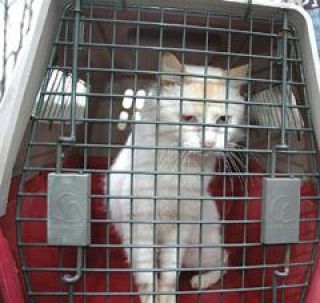By John Leggett-The Courier-Herald
The Plateau's dogs and cats generally take matters into their own paws when it comes to propagating their species.
It's simply a matter of nature taking its course, unless the animal's caretaker chooses to curtail a family pet's involvement in fertility rites by spaying or neutering their sexually active animal.
While such surgically prudent perogatives might be wise, they're not always financially feasible, especially for those living on public assistance or disability income.
This is where Pasado's Safe Haven enters the picture. The privately-funded organization, based in the small Washington community of Sultan, exists to stave off the growing problem of feral cats and stray dogs and protect animals from cruelty.
Pasado's operates a mobile service truck, which staffers lovingly refer to as the Spaystation, driving to different locations once a month to offer spay and neuter surgeries. The service is free to those who qualify based on economic status and is offered at a substantial discount for others.
The Plateau community of Black Diamond is a regular stop.
The minimum charge to have a female dog spayed at a traditional veterinary clinic is in the neighborhood of $135, while the less-invasive process of neutering a dog is about $115. Similar surgeries on a family feline are generally less.
Pasado's charges $50 for dog spaying, $40 for dog neutering, $30 for cat spaying and $20 for cat neutering, but the fee is waived for animal lovers with proof of public assistance.
Mark Vines delivered his 3-year-old, white, male cat, Screamer, to be neutered during a recent Pasado's stop at the Black Diamond Community Center parking lot.
“My neighbor told me about the service and I decided to get Screamer done,” Vines said. “I was really kind of surprised when they didn't charge me anything.”
Joan Dwigans, an Auburn resident who had a tiny, mixed-breed puppy taken care of the previous day, paid $5 for pain medication but the surgical procedure was without charge. Due to a job-related injury, she is currently living on a disability income.
John Matthews, a professional falconer living in Ravensdale, had taken his mother's three cats to be taken care of a short time ago.
“My mother is on Social Security and I brought her cats in to be fixed,” Matthews said. “I really believe in controlling the pet population because if it isn't controlled these wild or feral animals will be living among us in barns, alleyways and sometimes underneath houses.”
Such animals are generally considered a nuisance and wind up euthanized.
“That's just not a very humane option for our society,” Matthews said.
Dr. Deepak Sharma, who had worked at the Kenmore Animal Hospital, was recruited to become part of the five-vet rotation that carries out daily procedures.
“I told them that I was most definitely interested in helping them be a part of controlling the pet population in western Washington,” Sharma said.
Pasado's operates an 80-acre wooded pasture just outside Monroe, Wash., that tends to abused or neglected animals of all kinds that have slipped through society's cracks.
During the recent flooding in Lewis County, Pasado's was there, furnishing dry food for stranded animals, along with warm and dry bedding.
Call Pasado's Safe Haven at 360-793-7729 for times and locations of the Spaystation's monthly arrival or visit www.pasadosafehaven.org.
John Leggett can be reached at jleggett@courierherald.com.



